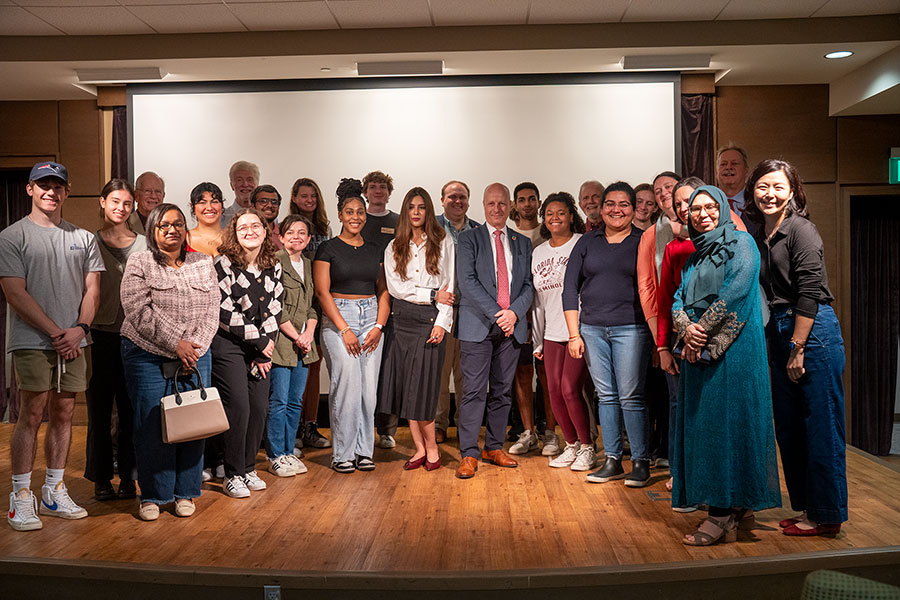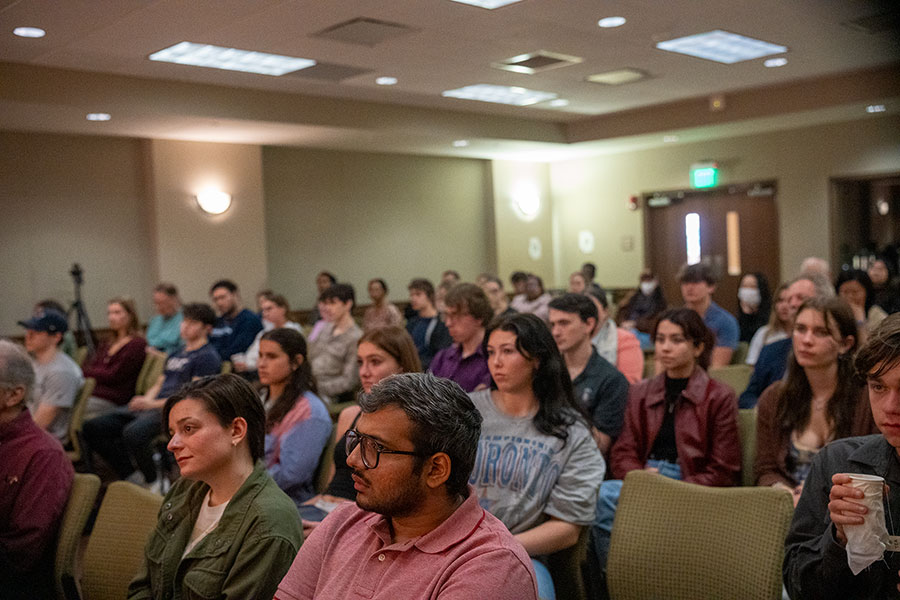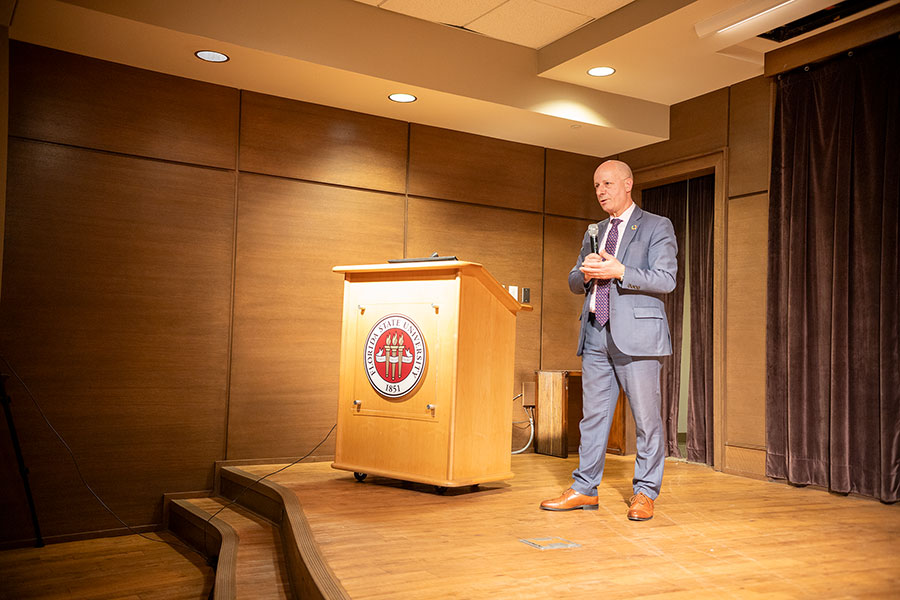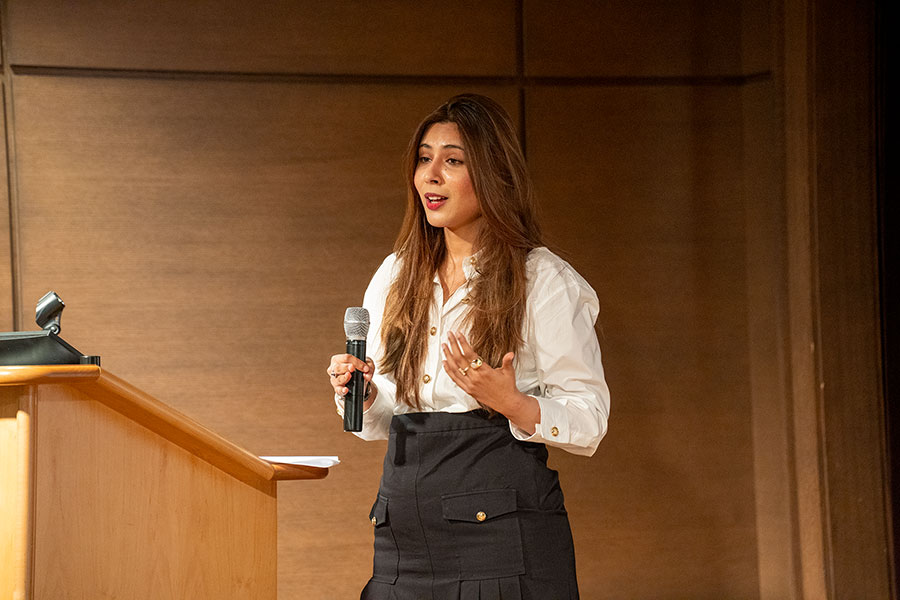
Two keynote speakers at Florida State University’s South Asian Media and Cultural Studies Conference (SAMCS) recently challenged students to transform global challenges through communication and collaboration.
For the past 11 years, FSU’s College of Communication and Information has hosted the conference, in collaboration with the College of Social Sciences and Public Policy’s Ruth K. Shepard Broad International Lecture Series and the Center for Global Engagement’s Engage Your World Speaker Series.
This year’s theme — “Celebrating Voices” — sought to foster a sustainable and responsive partnership in the region, uniting research, practitioners and community experts to help chart the course in the media and cultural studies and practices in South Asia.
Maher Nasser, director of outreach in the United Nations Department of Global Communications, delivered the talk “The Power of Voice as a Tool for Change.” Nasser has over 37 years of experience in the U.N, previously serving as Acting Undersecretary-General for Global Communications in 2012, 2014-15 and 2017. He also served as the Commissioner-General of the U.N. at Expo 2020 in Dubai.
Nasser stressed the importance of personal stories over statistics during his talk.
“U.N. entities who are working to save lives though humanitarian interventions do not rely on numbers to create empathy and raise funds and support for their operations and protection for the vulnerable,” Nassersaid. “Whether they are refugees, displaced people, children, women or minorities, they rely on human-centered stories that can touch people in ways that statistics and tables cannot.”
The closing keynote speech was delivered by Farwa Aamer, director of the South Asia Initiatives at the Asia Society Policy Institute where she oversees the institute’s policy work and projects in the region. Aamer has organized high-level discussions designed to facilitate greater inter-and intra-regional cooperation on water, energy, climate action and sustainable development in South Asia, the Middle East and North Africa, and Central Asia.
Her speech, “Unlocking South Asia’s Potential,” explored South Asia’s role as a rising power in geopolitics and how to maximize the region’s potential by engaging the youth population and fostering regional connectivity over common ground.
“In a world grappling with shared challenges, we need fresh perspectives,” Aamer said. “We need innovative thinking, we need innovative diplomacy, and, dare I say, we need a little bit of idealism. Who else to bring that to the table other than the youth of today?”
Aamer also emphasized diplomacy as a bridge-building tool to turn obstacles into shared goals.
“Imagine what South Asia could achieve if its nations worked together,” she said. “Trade, innovation and economic integration could turn this region into a global powerhouse. But that starts with trust, dialogue and a commitment to shared goals.”
The SAMCS conference is a global platform for researchers, academics and practitioners who actively contribute to the advancements of the media and cultural research, policies and practices in South Asia.
“SAMCS is a vibrant platform to reflect the inter- and intra-cultural diversity of South Asian countries,” said Pooja Ichplani, a professional research assistant in the School of Communication who served on this year’s planning committee. “I am proud to be associated with this thoughtful initiative by FSU that involves the South Asian scholars having a dialogue about the region. I am happy that we are able to provide a hybrid forum that transcends international boundaries.”
The conference aims to spark new ideas, conversations and scholarly collaborations through engaging presentations, discussions and shared experiences to celebrate and amplify underrepresented voices in South Asia, and beyond. The modern nations of South Asia include Afghanistan, Bangladesh, Bhutan, India, Maldives, Nepal, Pakistan and Sri Lanka.
“This was our largest year so far, with close to 40 presenters discussing topics from South Asian art, music, film, digital media and activism,” said Rebecca Peters, coordinator for this year’s SAMCS conference and a Ph.D. candidate in the Department of Religion. “Our theme this year brought many speakers who raised voices of under-represented groups in different nations across South Asia. The conference helps unite scholars across political borders in ways that help improve our world.”
The SAMCS Conference was held in partnership with the Department of Media Studies at CHRIST University, a deemed-to-be university in Bangalore, India.
The connection between FSU’s School of Communication and CHRIST University was built by Kailash Khoushik, an FSU alumnus who earned his Ph.D. in Media Studies from the School of Communication and is now an assistant professor at CHRIST University. Each year experts in South Asian media are encouraged to present at SAMCS and Media Meet, the Department of Media Studies at CHRIST University’s annual conference on media, culture and society.
For more information about the SAMCS conference, visit comm.cci.fsu.edu/faculty-research/south-asian-media-studies/.






